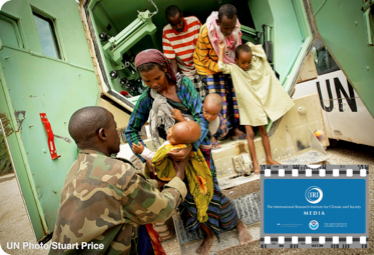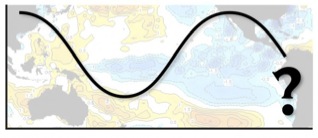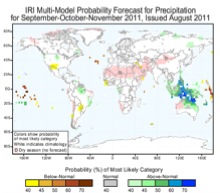If you're having trouble seeing international characters or other parts of this html page, click here to view online.
Research In Context: IRI scientists discuss East Africa
A key part of IRI’s mission is to apply its climate research and expertise to help societies reduce their vulnerability to droughts, floods and other risks. Our scientists have recently been sharing their thoughts and perspectives on the famine in the Horn of Africa in a series of video interviews.


What do the economy and tropical ocean temperatures have in common? They’re both exhibiting patterns very similar to 2008. Read our story about the climate phenomenon that just doesn’t seem to want to go away.
Follow our updates ![]() @climatesociety
@climatesociety
Climate Cycles Are Driving Wars, Says Study
In the first study of its kind, researchers have linked a natural global climate cycle to
periodic increases in warfare. The arrival of El Niño, which every three to seven years
boosts temperatures and cuts rainfall, doubles the risk of civil wars across 90 affected
tropical countries, and may help account for a fifth of worldwide conflicts during the past
half-century, say the authors. The paper, written by an interdisciplinary team at Columbia University’s Earth Institute, appears in the current issue of the journal Nature. Read more.
UPCOMING EVENTS AND SEMINARS
Sept. 2: IRI Seminar at Lamont Campus: A 30-Year High-Resolution Model Reanalysis
Of Dust And Climate For The Meningitis Belt. view
Sept. 14: Columbia Climate Center: Emission Policies - Quantifying Impacts &
Analyzing Strategies. view
IN THE SCIENCE PRESS...
A Significant Component of Unforced Multidecadal Variability in the Recent Acceleration of Global Warming. T. DelSole, Michael Tippett, J. Shukla., 2011. Journal of Climate.
Downscaling projections of Indian monsoon rainfall using a non-homogeneous hidden Markov model. Arthur M. Greene, Andrew W. Robertson, Padhraic Smyth, Scott Triglia, 2011. Quarterly J.of the Royal Met. Society.
Africa needs climate data to fight disease. Madeleine C. Thomson, Stephen J. Connor, Stephen E. Zebiak, Michel Jancloes & Abere Mihretie, 2011. Nature.
Peruse all of the IRI's scientific publications and reports in our database.
IRI IN THE NEWS
Flood Fears Drive More To Insurance (The Wall Street Journal). view
Experts Link East Africa Drought to La Niña in the Pacific (Voice of America). view
Averting a swarm (Nature). view
CURRENT SEASONAL RAINFALL FORECAST

The International Research Institute for Climate and Society was established as a cooperative agreement between
the U.S. National Oceanic and Atmospheric Administration's Climate Program Office and Columbia University.
It is part of The Earth Institute, Columbia University.